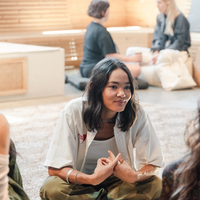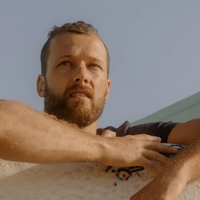TL;DR:
- The earlier in the day we’re exposed to light, the earlier at night we will start feeling tired and fall asleep.
- The more artificial light we take in after sunset, the more melatonin production is delayed—making it harder to fall asleep.
- Going outside soon after waking—ideally soon after daybreak—is an effective way to set one’s circadian rhythm. Leave the sunglasses behind in order to get the benefits.
- When we’re adequately exposed to light during the day and little light at night, our bodies naturally start falling asleep at sunset and waking up at sunrise.
Until the advent of electricity, humans rose with the sun and retired to bed when it set. This is because human bodies have an internal clock that is nearly synched to the 24-hour day called the circadian rhythm, which regulates our sleep-wake cycle.
“If you are in a dark cave with no time cues, you're going to continue to have those circadian rhythms,” says Mariana Figueiro, director of the Light and Health Research Center at the Icahn School of Medicine at Mount Sinai.
Photoreceptors in the eye respond to light and help set this biological clock. Light snaps us awake and lack of light allows for sleep, thanks to the production of melatonin, a hormone that promotes sleep and which gradually increases in the body as the day gets darker. The earlier in the day we’re exposed to light, the earlier at night we start producing melatonin, which leads us to feel tired and eventually fall asleep. Going to bed earlier may allow us to get more hours of sleep, which comes with plenty of benefits.
The Dark Side of Too Much Light at Night
The more light we take in after the sunset—from our phones, TVs, laptops and even light fixtures—the more we delay the production of melatonin and the later we fall asleep. Humans are more sensitive to light during the night and less so during the day. Studies have shown that nighttime light sensitivity can result in the suppression of melatonin production and a delay in the onset of sleep if exposed to light after sunset. Another study found that exposure to light at night disrupts sleep, which may contribute to depression. Additionally, the National Council on Aging published research showing that blue light exposure right before bed can confuse your body’s natural sleep cycle. This confusion can result in trouble falling and staying asleep.
“What the modern light environment does is cause us to go to sleep too late and shifts both our sleep and internal clock later than it would be in a natural life cycle,” says Steven Lockley, a neuroscientist at Brigham and Women’s Hospital and an associate professor of medicine at Harvard Medical School.
Maintaining a Daytime Light Diet
The good news is that getting light throughout the day can help get our circadian rhythms back on track. A 2016 study found that participants were more alert and had faster reaction times when exposed to blue light (such as the kind of bright light emitted from electronic devices that have blue wavelengths) in the morning. Morning exposure to light also triggers the release of cortisol, research shows, which promotes alertness.
In a 2017 study, Figueiro researched how light impacted office workers and found that those who were exposed to bright light, both natural and electric, in the morning had an easier time falling asleep at night and had higher quality sleep overall. When participants were subjected to light all day, they slept better and had reduced levels of depression. Two years later, Figueiro found that exposure to blue light in the morning advanced the circadian rhythm—meaning the participants fell asleep earlier at night—allowing them to wake up earlier on subsequent days.
Since the circadian rhythm is fairly closely aligned with the rising and setting of the sun, remaining exposed to light throughout the day keeps us awake—and avoiding bright light at night helps us fall asleep. Although Figueiro says that our eyes are technically unable to discern the source of light, she adds that it makes a slight difference whether our bright morning and daytime light comes from the sun or indoor lights. This is because sunlight is the light source our bodies were first designed to respond to.
“The most effective way, and [what] I think is the best light source, is definitely natural light because it’s ideal—it’s what we’ve been designed for,” she says. “It doesn't mean that it’s the only way to get it. It’s the most practical, it’s the ideal light source, and you can compromise … and do what you need to do with electric lighting.”
To get the optimal dosage of natural light, Figueiro recommends taking a walk (or bike ride or run) for 30 minutes to an hour in the morning right after daybreak, sitting by a window while working, and opening up shades and blinds whenever you can. (Neuroscientist Dr. Andrew Huberman, meanwhile, recommends going outside for between two and 10 minutes upon waking—without sunglasses, it’s worth noting—in order to reap these benefits.)
In fact, workers who are exposed to more natural light in the office report higher levels of well-being and better quality of sleep, according to a 2014 study.
“If you don’t have the ability to have access to natural light, increase the amount of light you have in the space during the day,” by adding more lighting fixtures, Figueiro says. “I’d say you need two times the amount of what you typically get.”
When we’re adequately exposed to light during the day and little light at night, our bodies naturally start falling asleep at sunset and waking up at sunrise, research shows. By living more in line with the natural rotation of the Earth, our circadian rhythm and sleep patterns will be all the more functional, resulting in higher quality sleep—which is something we can all appreciate.
TAKE IT FURTHER: Want to learn more about how to optimize your sleep through light intake? We recommend listening to this recent interview with neuroscientist Dr. Andrew Huberman on The Tim Ferriss Show.
Allie Volpe is a journalist based in Philadelphia. She has contributed to the New York Times, The Atlantic, Rolling Stone and more. Follow her on Twitter.




